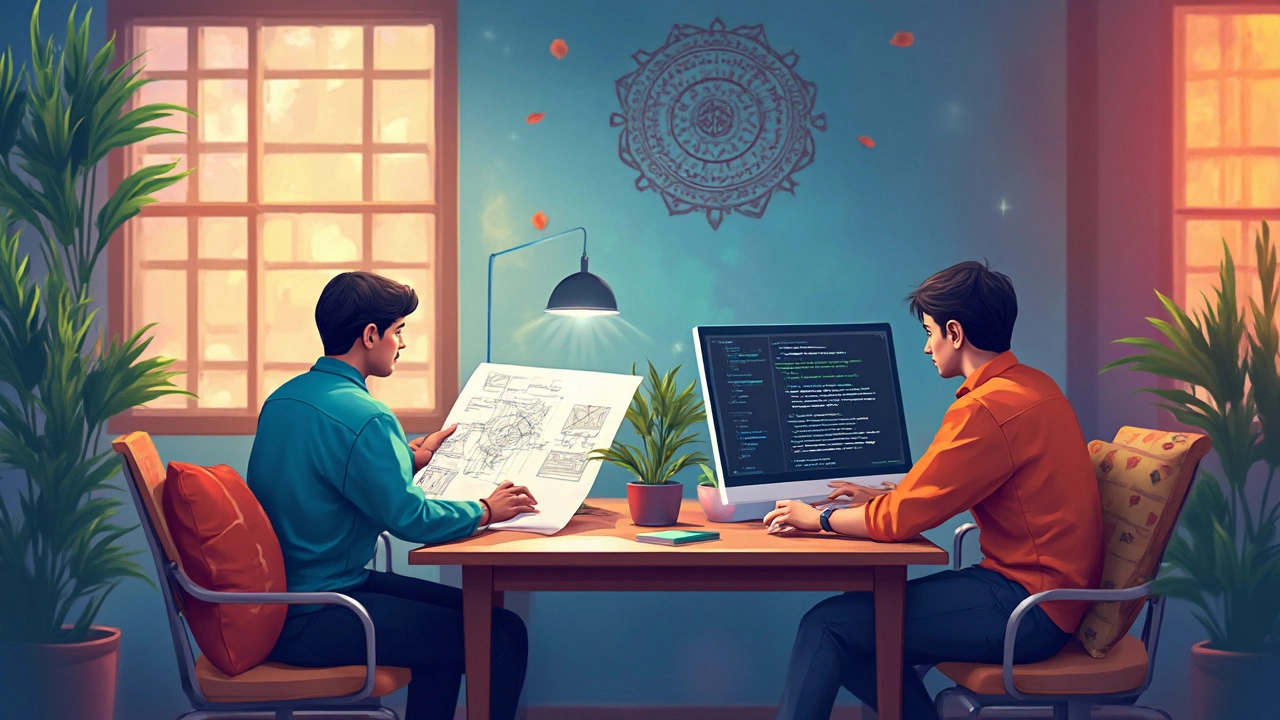Have you ever found yourself tangled in the tech lingo of programming and coding, wondering what exactly sets them apart? You're not alone! Let's clear the fog a bit. Programming involves crafting a solution from start to finish, designing algorithms, and planning how software should function. It’s about thinking big, focusing on the entire system. Coding, on the other hand, is writing the actual lines of code that computers understand and execute — it’s more hands-on and often what people imagine when they think of building apps or websites.
So, why does this matter? Well, both skills have unique perks and choosing the right one depends on what you want to do. If you see yourself as a tech architect or enjoy problem-solving on a macro level, programming might be your jam. But if you love getting your hands dirty with detailed work and testing bits of code, coding could be your sweet spot.
- Understanding Programming and Coding
- Benefits of Learning Programming
- Advantages of Learning Coding
- Making the Right Choice for You
Understanding Programming and Coding
When you're just getting your feet wet in the tech world, the terms programming and coding might seem like two sides of the same coin. But they're not exactly interchangeable, and knowing their differences can set your learning path in the right direction.
The Big Picture: What Is Programming?
Think of programming as the blueprint for a house. It's about planning, problem-solving, and designing the entire system. Programmers consider how different parts of the software will communicate and operate together. It's strategic and requires understanding algorithms, data structures, and possibly even familiarizing yourself with multiple languages. In short, programmers are like tech architects.
The Nitty-Gritty: What Is Coding?
Coding, however, is more like the actual construction work. You're getting down to writing lines of code that computers can parse and execute. It's about translating the programmer’s blueprint into a language the machine understands. Common languages include Python, JavaScript, and C++. Coders focus on specific tasks, debugging code, and ensuring the software functions as expected.
Key Differences
- Programming involves conceptualizing and designing solutions.
- Coding focuses on writing the actual code.
- Programmers typically use more tools to map out logic and structure.
- Coders work more directly with syntax and error checks.
Both fields require a good chunk of skill and patience. Many folks start with coding to get a feel for it before diving into the broader aspects of programming. Whichever you choose will depend on whether you prefer designing solutions from a high-level perspective or enjoy crafting detailed code to bring these solutions to life.
Benefits of Learning Programming
Ever wondered why so many people are diving into programming these days? Well, it's more than just a trend. Learning programming opens up a new universe of opportunities, whether you're eyeing a tech job or planning to flex your entrepreneurial muscles.
Career Opportunities
The tech industry is constantly evolving, and companies are always on the lookout for skilled programmers. Whether you want to work for tech giants or lean startups, programming skills are a ticket to a broad range of job roles. You could become a software developer, systems analyst, or even a data scientist.
Check this out: according to the World Economic Forum, programming-related jobs rank among the top emerging professions globally. The demand isn't slowing down anytime soon.
Creative Freedom
Programming is like having a superpower. You get to build apps, create websites, and solve problems in ways that haven't been thought of yet. It's an incredible feeling to see your ideas come to life right in front of your eyes. Plus, it’s immensely satisfying to tinker with code and watch it do cool stuff, making you a problem-solving wizard of sorts.
Coding as a Language
Learning coding is akin to learning a new language. And much like speaking a second (or third) language, coding breaks down international borders. You can collaborate with teams worldwide, participate in exciting international projects, and connect with global communities who share your interests.
| Programming Languages | Usage |
|---|---|
| Python | Data science, web development |
| JavaScript | Web development, mobile apps |
| Java | Enterprise-level applications |
Enhanced Problem-Solving Skills
One of the most underrated benefits is the way it fine-tunes your noggin. Programming challenges you to think logically and critically. It hones your ability to break down complex problems into manageable chunks — a handy life skill that goes beyond just tech.
So, thinking about diving into programming? It's not just about landing a job; it’s about learning how to think in new and innovative ways. Whether you decide to take classes or self-learn, embracing the world of programming could be one of the smartest moves you make.

Advantages of Learning Coding
So you're thinking about diving into the world of coding? That's awesome! Coding is like the building blocks for creating apps and websites. Whether you're looking to start a new career or just pick up a new skill, there are plenty of reasons to get into it. Let's break down why learning to code could be a game-changer for you.
High Demand Jobs
Coding skills can open doors to some of the most in-demand jobs out there. Tech companies are always on the lookout for people who can write clean and efficient code. Plus, it’s not just tech companies. Industries like finance, healthcare, and entertainment need coders too.
"We live in a digital world, and coding is the language of that world. Learning to code empowers you with the tools to solve problems and innovate," said Mitch Resnick, Professor of Learning Research at MIT.
Flexibility of Work
With coding skills under your belt, the flexibility you gain in terms of work environment is huge. Many coding jobs offer the chance to work remotely. Imagine working from a beach in Bali or a cozy café in Paris. It's totally possible!
Creativity Unleashed
Coding isn't just about numbers and algorithms; it's a creative field too. When you code, you're essentially building something from scratch. Whether it's a cool app or a new feature for a website, coding lets you bring your ideas to life.
Problem-Solving Skills
Coding pushes you to think logically and solve problems efficiently. You'll learn to break down complex problems into manageable chunks. It's like working out your brain muscles on the regular.
In short, coding is versatile and equips you with a skill set that is both marketable and personally rewarding. So why wait? Start learning and see where your new coding journey takes you!
Oh, and don't forget to check out some online resources. There are tons of free and affordable platforms to learn coding!
Making the Right Choice for You
So you're on the fence about whether to focus on programming or coding? Let's break it down so you can make a decision that's right for you.
Consider Your Interests
Start by thinking about what parts of technology excite you. If you're someone who loves solving puzzles and creating systems from scratch, programming might suit you better. Programming allows you to dive into the architecture of software, focusing on how everything fits together to create a seamless experience.
On the other hand, if you find joy in getting tasks done, debugging, and working with specific code to make things function, then coding could be more aligned with your interests. Coding is about writing precise instructions for computers, and it's where you get really hands-on.
Evaluate Career Goals
Your career aspirations can also inform your choice. Programming skills are often necessary for roles like software developer or systems architect. These positions mean looking beyond immediate tasks and thinking about long-term software project planning.
Coding skills are indispensable in software engineering, web development, and specific applications like game or app development. These roles focus more on creating things people use every day. Both paths offer unique challenges and rewards, so think about where you see yourself in the tech world.
Learning Approach
Next, consider how you like to learn. Programming can be more abstract and theoretical at first, dealing with concepts that apply across different projects and industries. If you're a conceptual thinker, you'll likely enjoy this route.
Conversely, coding is more straightforward to jump into—all you need is your computer and an internet connection, and you can apply what you learn immediately. It's practical and allows for fast feedback, which keeps motivation high, especially in the early learning stages.
Real-World Stats
To shed light on industry trends, here's a snapshot:
| Field | Average Salary (2023) | Job Growth Rate |
|---|---|---|
| Programming | $95,000 | 22% |
| Coding | $75,000 | 20% |
A quick look at average salaries and job growth rates can also help in decision-making. Both paths offer lucrative careers with the tech industry consistently expanding, but slight differences might sway your decision depending on your goals.
Ultimately, whether you choose programming or coding, both pathways offer valuable skills that can open doors to exciting opportunities in the digital world. So weigh your options, reflect on your interests and career goals, and jump into the world of tech!




